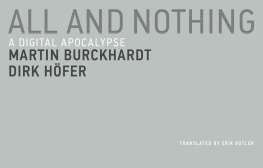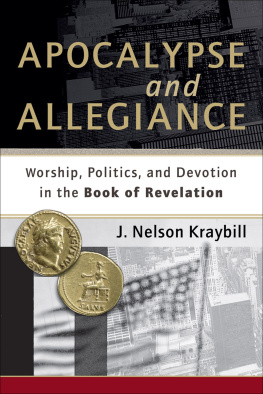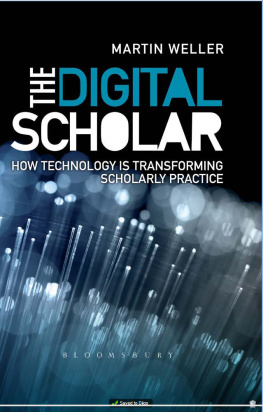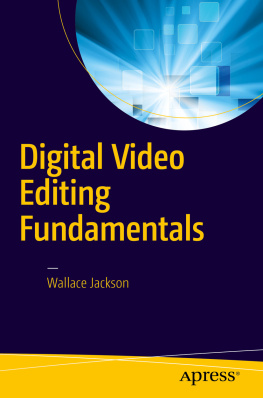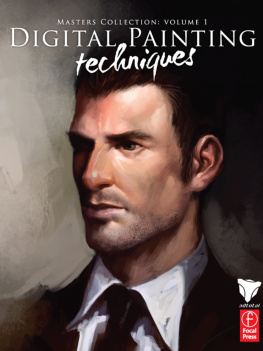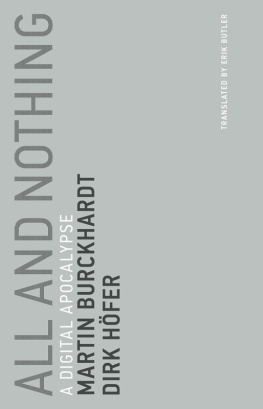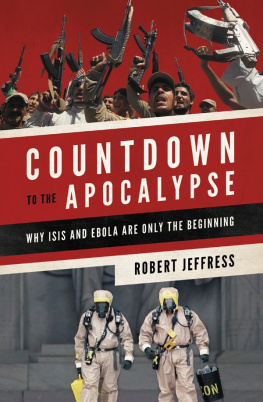
Untimely Meditations
1.The Agony of Eros
Byung-Chul Han
2.On Hitlers Mein Kampf: The Poetics of National Socialism
Albrecht Koschorke
3.In the Swarm: Digital Prospects
Byung-Chul Han
4.The Terror of Evidence
Marcus Steinweg
5.All and Nothing: A Digital Apocalypse
Martin Burckhardt and Dirk Hfer
6.Positive Nihilism: My Confrontation with Heidegger
Hartmut Lange
7.Inconsistencies
Marcus Steinweg
8.Shanzhai: Deconstruction in Chinese
Byung-Chul Han
All and Nothing
A Digital Apocalypse
Martin Burckhardt
Dirk Hfer
translated by Erik Butler
The MIT Press
Cambridge, Massachusetts
London, England
This translation 2017 Massachusetts Institute of Technology
Originally published as Alles und Nichts: Ein Pandmonium digitaler Weltvernichtung in the series Frhliche Wissenschaft by Matthes & Seitz Berlin: Matthes & Seitz Berlin Verlagsgesellschaft mbH, Berlin 2015. All rights reserved.

The translation of this work was supported by a grant from the Goethe-Institut.
All rights reserved. No part of this book may be reproduced in any form by any electronic or mechanical means (including photocopying, recording, or information storage and retrieval) without permission in writing from the publisher.
This book was set in PF DIN Text Pro by Toppan Best-set Premedia Limited. Printed and bound in the United States of America.
Library of Congress Cataloging-in-Publication Data
Names: Burckhardt, Martin. | Hfer, Dirk, 1956- | Butler, Erik, 1971- translator.
Title: All and nothing : a pandemonium of digital world destruction / Martin Burckhardt and Dirk Hfer ; translated by Erik Butler.
Other titles: Alles und Nichts. English
Description: Cambridge, MA : The MIT Press, [2017] | Series: Untimely meditations | Includes bibliographical references.
Identifiers: LCCN 2017002616 | ISBN 9780262534253 (pbk. : alk. paper)
eISBN 9780262342735
Subjects: LCSH: Digital media. | Information society. | Philosophy and civilization. | Nothing (Philosophy)
Classification: LCC B54 .B8713 2017 | DDC 100--dc23 LC record available at https://lccn.loc.gov/2017002616
ePub Version 1.0
1 Revelation
Boole and the Formula
In the beginning was the Zero, and the Zero was with God, and God was the One. The Zero and the One were with God in the beginning. Through them all things were made; without them nothing was made that has been made. In them was life, and life was the light of men. The light shines in the darkness, but the darkness has not understood it.
In 1854, the British mathematician George Boole published Investigations of the Laws of Thought. The author had experienced an ecstatic vision in his youth that set the course for his intellectual life. The book presented the idea of a universe whose elements could be understood in terms of the logic of presence or absence: 0 or 1. In Boolean algebra, the world of numbersand along with it, the world as a wholebreaks down into binary code. Numbers as we know them are forms through which this coding manifests itself. In other words, they do not represent anything. The Boolean digits 1 and 0 do not designate a quantity; instead, they mark presence and absence. Thus, 1 stands for the universe, and 0 stands for nothingness. Nevertheless, the terms are not governed by a mutually exclusive relationship. Their relationship is complementary: they follow the same logic. Just as 1 times 1 always yields 1, and 0 times 0 always produces 0, x times x always equals x in the Boolean world. For the same reason, All and Nothing meet up in the formula x = xn. Because x can stand for anything and everythingindeed, for the universe in its entiretyit is no exaggeration to speak of a digital world formula in this context.
The world may be conceived as a vast magnet oscillating between a positive pole and a negative pole, that is, in terms of dyadic logic. This perspective is rife with significance, for whatever can be electrified can also be digitized. Accordingly, x may stand for an alphanumeric sign, a sound file, or an image; it may just as readily indicate the level of hemoglobin in ones blood as measured by a sensor, or the coordinates of a migrating whale. Indeed, it may stand for all we have yet to digitize in the future: our speech acts, emotions, and dreams. At any rate, when it is digitized, a given x no longer stands as a singularity, an isolated entity; the formula allows us to duplicate it at will. In fact, x duplicates itself on its own: it turns into a population.
The equation x = xn, then, heralds proliferation; it announces a land of milk and honey where everything is available at all times in unlimited supply. That said, the promise of total accessibility harbors a threat, too. The digital universe stands before a gaping void, a fantasy of global destruction that releases all manner of demons. Although analog reality will survive digitization, we can already sense that it is deteriorating into an atrophied likenessa facade or ashen shadowof itself. In its digital mode of presentation, realitys effects are far more potent: seemingly infinite, lasting forever, everywhere.
Nor does the Boolean formula bear on the virtual sphere alone. Retroactively, it affects the phantasms that structure our reality. It encompasses the real economy; it transforms our bodies and our understanding of identity and freedom; it pervades politics; and it changes how we perceive time and space. It affects our very humanity. In this sense, the world around us has long since followed the Boolean mantra: Through the Zero and the One all things were made; without them nothing was made that has been made.
The Darkroom of History
It is well known that the best way to hide a secret is to place it in plain view. Accordingly, our contemporary society of information, which measures everything in bits and bytes, remains blind to the meaning and origin of its own concept of information. The situation resembles that of money: it is simply taken as something given. Everyone depends on it, but no one asks how the mental continent on which our information society has settled came to enter the world in the first place. When Claude Shannon, the father of information theory, published The Mathematical Theory of Communication in 1948, he applied what Boole, the British autodidact and mathematician, had published a century earlier. Shannons contributionand this point is remarkableinvolved only engineering and application. His act of technological fertilization didnt even touch on what had prompted Boole to construct his intellectual edifice; therefore, his thoughts on it remained without consequence. This silence at the moment of triumph is all the more astonishing given that Booles theory had prompted great commotion elsewhere. In 1879, when Gottlob Frege published his Begriffsschrifta foundational work for analytic philosophy to this dayone of the first reviewers, the mathematician Ernst Schrder, described it as a mere rewriting of Booles ideas. Embarrassed that he had not built the intellectual structure but simply adapted it for his own use, the author did everything in his power to downplay Booles role in the Fregean Revolution.
In turn, Claude Shannon, when asked repeatedly about his eureka moment, dodged the question and claimed that if such a moment had occurred, he wouldnt even have known how to spell eureka. And so, because we collectively imagine the computer, as a material entity, to be a product of the twentieth centuryand not the nineteenthBoole has now been forgotten by the computing world, even though every single programmer encounters his legacy daily in the form of Boolean operators.
Next page
